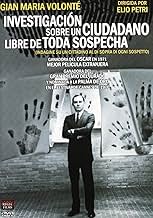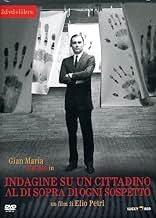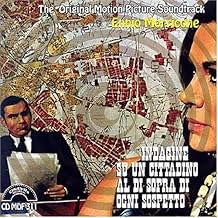VALUTAZIONE IMDb
8,0/10
13.871
LA TUA VALUTAZIONE
Il capo della sezione omicidi uccide la sua amante e lascia deliberatamente indizi per provare la propria colpevolezza.Il capo della sezione omicidi uccide la sua amante e lascia deliberatamente indizi per provare la propria colpevolezza.Il capo della sezione omicidi uccide la sua amante e lascia deliberatamente indizi per provare la propria colpevolezza.
- Vincitore di 1 Oscar
- 16 vittorie e 6 candidature totali
Trama
Lo sapevi?
- QuizThe main character's name is never revealed.
- Citazioni
Il Dottore - Former head of homicide squad: The people are underage, the city is sick. Others are tasked with educating and curing this. Our duty is to repress it! The repression is our vaccine! Repression and civilization!
- Versioni alternativeThe subtitled American version distributed by Columbia has slight differences in the credits. The Italian version opens with blank white-on-black credits (as many other Petri films do). The American version projects the credits onto the opening scene with the Dottore walking around the street. Both the opening and the closing credits (including the film's title and the Kafka quotation) are translated to English as well.
- ConnessioniEdited into Colpiti al cuore (2019)
Recensione in evidenza
The final scene in Elio Petri's 1970 Investigation of a Citizen Above Suspicion concludes with a quote from Kafka's The Trial: "Whatever he may seem to us, he is yet a servant of the Law; that is, he belongs to the Law and as such is set beyond human judgment." What Petri has left out from this excerpt is also that "to doubt his integrity is to doubt the Law itself". The "he" in question here is the man of the Law the police inspector played brilliantly, hair slicked back et al, by Gian Maria Volontè. Without any scruples, we see the Inspector coldly cut his mistress's throat with a razor between the sheets in a kinky role-playing romp, sans scruples, only to prove to himself if he is, as he believes, a citizen above suspicion and beyond the Law which he so firmly adheres to.
This complex film is a cinematic gem thanks to its multifarious tropes at times absurd black comedy, at times vitriolic political satire, at times psychological study into sexual fetishism and power. Of course, all of these themes intermingle so effortlessly that you can't help but be taken aback by the richness of Petri's byzantine vision. The left-leaning director here depicts the autocratic terror that overtook Italy in the late 60s, an overture to the tense, decade-long period known as the "years of lead" in Italian politics a time of fascist repression and a struggle between the equally-as-extreme left and right of center parties.
Beyond its political overtones (which are universal yet now paradoxically outdated, as we see rebellious students waving their little red Maoist books around to anger the "fascist pigs" in the police force), Investigation plays its strongest and most universal hand in its view of authority, and specifically, those that wield an ungodly amount of it. The Inspector, in a snug, black suit, commands and degrades his subordinates, yet in the way a responsible teacher would reprimand a naughty student. That is, he believes his own righteousness and position, and here, once he commits the murder of Augusta Terzi (the stunning Florinda Bolkan), he leaves the Law to spin its wheels of Justice, having full confidence in the organ of power that commands him. As the Inspector sits in the office of his boss, the Commissioner (a sleazy Gianni Santuccio), he trembles like a child, waiting for approval and acceptance. After the latter admits to having an affair with the murdered victim, the unperturbed Commissioner asks him amidst a smoke-filled smirk, holding a cigar in his fat fingers, "So, was she, you know? Any good?" Here we can make the link between power and sexual impotence, as the simple reason the Inspector kills his lover is because she has brought to light his personal inadequacies as a man. An individual who holds such dominance over others, who commands such authority, is an addictive aphrodisiac for Bolkan's underwear-hating heroine, but after a while, she sees her Inspector is nothing more than a capricious child obsessed and deceived with a position of power that holds no integrity and no truth. For her, his sexual appeal has vanished, the organ of dominance has grown limp, as the incongruity between the Inspector's projected image and his actual self begins to grow. She hates his little black socks, his dull black suit, and his overall bureaucratic appearance. In a few great satirical moments, we see the impressionable Inspector strolling the streets in a trendy new khaki suit, a purple silk ascot, fashionable sunglasses a caricature of Italian culture to the fullest.
So what prompts Volontè's Inspector to make his final decision? Is he a stern follower of the Law who wants to test it and prove himself superior to his inept colleagues; a sadistic neofascist bureaucrat who lives for control and subjugation of others; an infantile with a bruised ego thanks to an untamable feminine force? Are we, as viewers, not to question his actions, but simply to accept them as necessary because he's "a man of the Law", superior to us, despite his faults, as Kafka leads us to believe or is that just Petri's tongue-in-cheek humor getting the best of us? That's the fun of this great film, and the kookiness of Ennio Morricone's twangy score adds to the comical effect of a dark and witty étude into power, sex, and politics.
This complex film is a cinematic gem thanks to its multifarious tropes at times absurd black comedy, at times vitriolic political satire, at times psychological study into sexual fetishism and power. Of course, all of these themes intermingle so effortlessly that you can't help but be taken aback by the richness of Petri's byzantine vision. The left-leaning director here depicts the autocratic terror that overtook Italy in the late 60s, an overture to the tense, decade-long period known as the "years of lead" in Italian politics a time of fascist repression and a struggle between the equally-as-extreme left and right of center parties.
Beyond its political overtones (which are universal yet now paradoxically outdated, as we see rebellious students waving their little red Maoist books around to anger the "fascist pigs" in the police force), Investigation plays its strongest and most universal hand in its view of authority, and specifically, those that wield an ungodly amount of it. The Inspector, in a snug, black suit, commands and degrades his subordinates, yet in the way a responsible teacher would reprimand a naughty student. That is, he believes his own righteousness and position, and here, once he commits the murder of Augusta Terzi (the stunning Florinda Bolkan), he leaves the Law to spin its wheels of Justice, having full confidence in the organ of power that commands him. As the Inspector sits in the office of his boss, the Commissioner (a sleazy Gianni Santuccio), he trembles like a child, waiting for approval and acceptance. After the latter admits to having an affair with the murdered victim, the unperturbed Commissioner asks him amidst a smoke-filled smirk, holding a cigar in his fat fingers, "So, was she, you know? Any good?" Here we can make the link between power and sexual impotence, as the simple reason the Inspector kills his lover is because she has brought to light his personal inadequacies as a man. An individual who holds such dominance over others, who commands such authority, is an addictive aphrodisiac for Bolkan's underwear-hating heroine, but after a while, she sees her Inspector is nothing more than a capricious child obsessed and deceived with a position of power that holds no integrity and no truth. For her, his sexual appeal has vanished, the organ of dominance has grown limp, as the incongruity between the Inspector's projected image and his actual self begins to grow. She hates his little black socks, his dull black suit, and his overall bureaucratic appearance. In a few great satirical moments, we see the impressionable Inspector strolling the streets in a trendy new khaki suit, a purple silk ascot, fashionable sunglasses a caricature of Italian culture to the fullest.
So what prompts Volontè's Inspector to make his final decision? Is he a stern follower of the Law who wants to test it and prove himself superior to his inept colleagues; a sadistic neofascist bureaucrat who lives for control and subjugation of others; an infantile with a bruised ego thanks to an untamable feminine force? Are we, as viewers, not to question his actions, but simply to accept them as necessary because he's "a man of the Law", superior to us, despite his faults, as Kafka leads us to believe or is that just Petri's tongue-in-cheek humor getting the best of us? That's the fun of this great film, and the kookiness of Ennio Morricone's twangy score adds to the comical effect of a dark and witty étude into power, sex, and politics.
I più visti
Accedi per valutare e creare un elenco di titoli salvati per ottenere consigli personalizzati
- How long is Investigation of a Citizen Above Suspicion?Powered by Alexa
Dettagli
- Data di uscita
- Paese di origine
- Lingua
- Celebre anche come
- Investigation of a Citizen Above Suspicion
- Luoghi delle riprese
- Azienda produttrice
- Vedi altri crediti dell’azienda su IMDbPro
Botteghino
- Lordo Stati Uniti e Canada
- 265.470 USD
- Tempo di esecuzione1 ora 55 minuti
- Mix di suoni
- Proporzioni
- 1.85 : 1
Contribuisci a questa pagina
Suggerisci una modifica o aggiungi i contenuti mancanti

Divario superiore
By what name was Indagine su un cittadino al di sopra di ogni sospetto (1970) officially released in India in English?
Rispondi






























